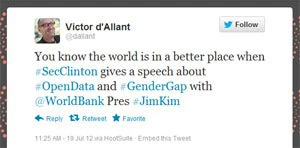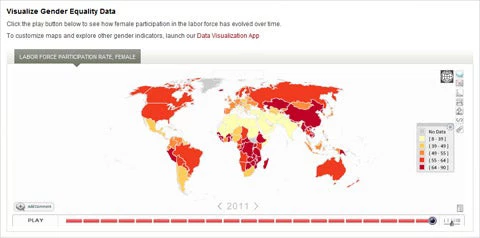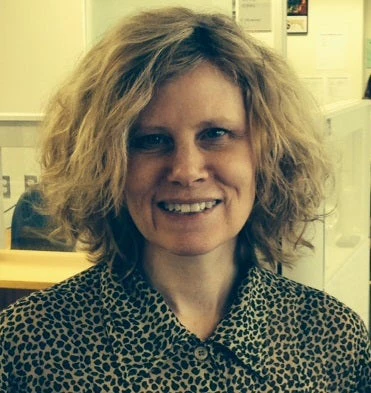The phrase “gender gap” may be well known – but what about the gender gap for data? Today at an event at the Gallup Organization in Washington, D.C., U.S. Secretary of State Hillary Clinton and World Bank Group President Jim Yong Kim called for better data-gathering on girls and women as an essential way to boost women’s empowerment and economic growth.
“Gender equality is vital for growth and competitiveness,” said Dr. Kim at “Evidence and Impact: Closing the Gender Data Gap” in Washington, co-hosted by the State Department and the Gallup Organization.
But the lack of gender-disaggregated data hampers development efforts in many countries, Dr. Kim said.
“We need to find this missing data. We need to make women count.”
Global progress is lagging on women’s voice and agency—the ability to act on one’s own behalf and participate in society, according to World Development Report 2012 on gender. And very little data is available on women’s economic opportunity and voice in developing countries.
To ease access to what does exist, Dr. Kim introduced the World Bank’s new Gender Data site -- a one-stop shop on gender data, including surveys, statistics, analytical work, and reference materials covering girls’ and women’s employment, access to productive activities, education, health, public life and decision-making, human rights and demographic outcomes.
Secretary Clinton also announced a new initiative, Data 2X, that will develop new curriculum standards to ensure data producers and users train in gender-sensitive techniques. The project will work with key data organizations, including the UN, World Bank, OECD, PARIS21, and Gallup, to also publish a roadmap on how to fill priority gaps in gender-sensitive data as quickly as possible. Data 2X will report on its progress in one year’s time.
Added Secretary Clinton: “If we’re serious about narrowing the gender gap and helping more girls and women, then we must get serious about gathering and analyzing the data that tell the tale.”
“We already know that investing in women delivers returns for entire societies, but we are missing critical information to guide our investments better... And since women make up half the population, that’s like having a black hole at the center of our data-driven universe.”
Citing the Human Development Report, Secretary Clinton said inequality between men and women can reduce a country’s overall progress in health, education, and standard of living by up to 85%.
Other studies have shown that eliminating barriers to women’s participation in certain industries or levels of management could increase the productivity of all workers from 3 to 25%. In addition, if women farmers had access to the same seeds, equipment, irrigation as men farmers, they could increase their crop yields by as much as 20 to 30% and feed up to an additional 150 million hungry people, Secretary Clinton said.
“This points to a tremendous opportunity. Elevating the status of women and girls has been shown to have a positive impact on entire societies and in country after country, education improves, spending on nutrition and health increases, productivity goes up, economies grow,” she said.
Dr. Kim and Secretary Clinton called for more investment in data and evidence to guide decision-making and help close the gender data gap. In the next year, the World Bank will aim to make progress in 10 countries where data is currently missing, said Dr. Kim.
The Bank’s new gender data site offers easy access to multiple sources of data on gender, including Global Financial Inclusion Index, GenderStats, World Development Indicators, the Bank’s Enterprise Surveys, Women, Business and the Law, and a host of other sources. Data visualization tools allow users to create maps, figures and charts using country-level data. The database will be continually updated as new data becomes available. As part of the World Bank’s broader open data initiative, visitors will be able access a whole range of data on Bank operations and financing.
“If we are to make significant and lasting change, we need to direct the data back towards developing countries,” said Dr. Kim. “By making data accessible, we can help empower men and women in the real world to become agents of change. This is important, because it’s only with sufficient country demand for better gender equality that we will ultimately succeed.”
Related Links:
Data Gaps Hampering Efforts to Empower Women
Photos: World Bank President Kim and US Secretary of State Clinton at “Evidence and Impact: Closing the Gender Gap” at Gallup




Join the Conversation